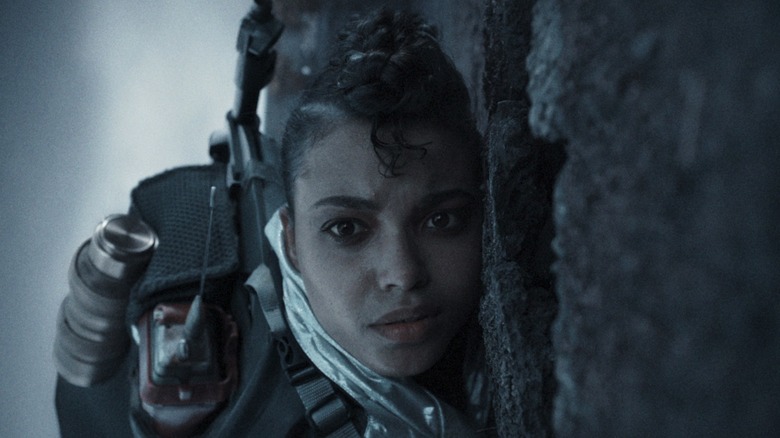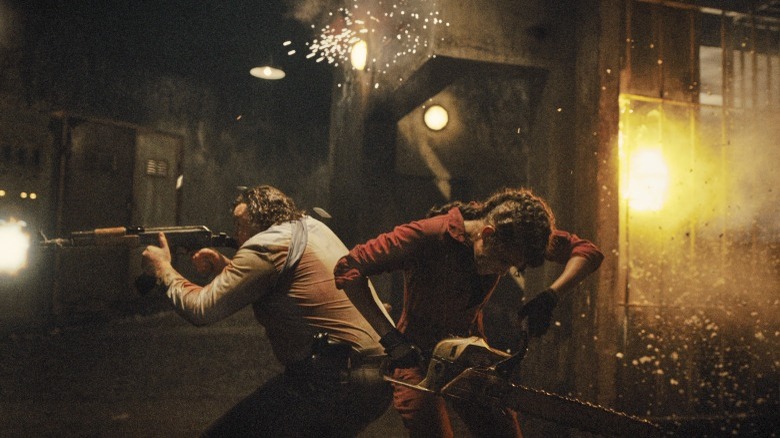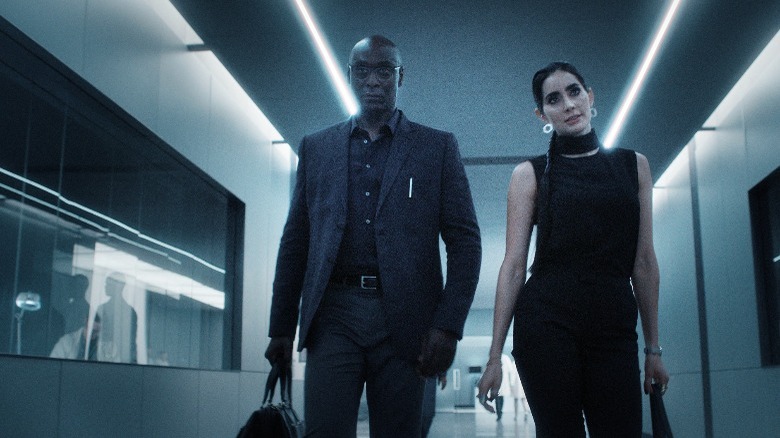Resident Evil Review: Strong Action And Monstrous Creatures Elevate The Latest Adaptation Of The Video Game Series
"They said the world would end in 2036, but they were wrong. The world ended a long time ago," Jade Wesker (Ella Balinska) tells us. She sounds pretty pissed off, but she has every right to be. The world technically hasn't ended, but most of the planet has been overrun by a virus that makes covid look like a walk in the park. A global breakout of the t-virus has turned civilians into blood-thirsty creatures who want nothing more than to tear into flesh. As the spectacular opening sequence of Netflix's "Resident Evil" shows us, the effect of the t-virus is even more devastating when animals are infected, often turning creatures into super-sized, and super-powered, versions of themselves.
The show, the latest adaptation of the hit video game series, unfolds over two timelines: one in 2036, where Jade is battling to survive an apocalyptic world, and desperately trying to research the infected to try and figure out how to eradicate the virus. The second occurs 14 years earlier, just three months before the breakout, when a young Jade (Tamara Smart) and her sister Billie (Siena Agudong) move to New Raccoon City with their father Albert Wesker (Lance Reddick). Albert is one of the highest-level employees at the all-powerful Umbrella Corporation, a company that finds itself in need of image rehabilitation after the tragic outcome of the original Raccoon City. Their solution lies in a new pharmaceutical: Joy, which promises to rid people of things like anxiety and depression and change the world in a positive way. As you can likely infer from the world imminently crumbling, the rollout of Joy does not go as planned.
"Resident Evil" is one of the most recognizable names in entertainment and a hugely successful horror franchise. Since the first video game was released in 1989, countless other "Resident Evil" games have followed, and there's even a six-film series starring Milla Jovovich that grossed over $1 billion at the box office. There's a heck of a lot of lore and stories readily available for a television series, but this new Netflix series tells a new story that both longtime franchise devotees and newcomers alike can enjoy. It of course borrows some familiar elements, largely things like the Umbrella Corporation, Raccoon City, the t-virus, and the one and only Albert Wesker, so those with previous "Resident Evil" knowledge can probably see what's coming a bit clearer, but the series is sure to pack some surprises.
High production values, medium storytelling
Thankfully, "Resident Evil" looks great. Post-apocalyptic films and shows are so often caked in a dreary, dusty greyness, but the production design is impressively varied. The show isn't afraid to use color, boldly using hues of blues, browns, and especially reds to keep things visually enticing. The earlier timeline in New Raccoon City is also wonderfully designed. Everything from the Wesker family home to the high school to the Umbrella headquarters is overwhelmingly white, creating an eerie, sterile feel that perfectly fits the idea of the Umbrella Corp-designed city.
What's most important when it comes to the world of "Resident Evil" is the monsters. I'm thrilled to report that the makeup and visual effects are really impressive, and the creatures that lurk in the show are legitimately menacing. There's a particularly massive monstrosity in the show's opening sequence that's actually jaw-dropping, and various creepers through the show feel believable. And "Resident Evil" isn't afraid to show the blood-soaked havoc and violence these monsters are capable of. The zombies are also positively grotesque, and what's really impressive is the individuality amongst the hordes, which goes a long way in building authenticity.
You may expect a show based on a horror video game franchise to be all about spooky violence, but "Resident Evil" is seriously devoted to world-building and storytelling. In 2036, Jade is tormented by what happened to both her sister and father during the outbreak, the reality of which is kept extremely close to the writers' chests — halfway through the series, their outcome is still very much a mystery.
It's a difficult balance to maintain, as a number of moments in the later timeline are wonderfully choreographed and exciting, and it's where most of the entertainment value in "Resident Evil" lies. Most of our time, however, is spent in the past, where things develop ... slowly. The show is trying to build up an expansive world rife with nasty corporate maliciousness, conspiracy theories, and medical jargon, and while that's all alarmingly relevant these days, it's not doing anything especially new. The whole greedy corporation thing feels particularly derivative, and while its critiques are valid, it all feels derivative.
A bingeable thriller
Fortunately, the performances are strong: Agudong really nails the moodiness of burgeoning teenage years, and Smart is a joy in a forceful charismatic performance as she comes to terms with what's about to happen to the world and her father's implications in it. And speaking of their father, Reddick is wonderful as Albert Wesker, torn between his role as a father and scientist, whose quiet, brooding intensity is highlighted in a spectacular moment at the high school principal's office. Balinska is strong as the adult Jade, showcasing an impressive physicality and no-nonsense ass-kicking of a great action star, but the vast majority of the character's development comes through her childhood self, leading our main character to feel a bit too thin at times. The talents of these performers are just enough to make the show still feel entertaining even when the plot starts to drag a bit, allowing a bit of forgiveness when some significant logical leaps occur to keep things going.
While "Resident Evil" really nails the action sequences and some chilling character designs, it's surprisingly light on these pivotal moments. It's a shame, as it's the best part of the show, and when things kick into full gear it feels as if the show could truly be one of 2022's great television offerings, but the thrills are too few and far between. Considering it's a horror franchise, it's also really light on genuine terror — it frequently fails to reach the dread-inducing heights of Mr. X jumpscares or walking around the mortifying house in "Resident Evil 7," and frankly, never comes close. Things do eventually pick up when it comes to some sweet fights and buckets of gore, but it really shouldn't take such a long time to really start cooking.
Despite some pacing issues and a generally unremarkable story, there's a lot of fun to be had watching "Resident Evil." It looks terrific and a lot of the characters are interesting, and when things get violent, the thrills are palpable. Things slowly ramp up over these four episodes, so here's hoping that the second half of this eight-episode season revels in what makes "Resident Evil" such a beloved franchise — endless, shocking terror, great characters, and a whole lot of grotesqueries.
"Resident Evil" hits Netflix on July 14, 2022.


